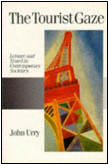In August last year, Julia’s Facebook feed was covered by people posting about the books that have “stayed with them.” The trend inspired us here at the 5th Floor to think about the books that have sparked our sociological imaginations over the years. Over the next few days, we’ll be sharing our picks:
Sarah Mosseri
If you were a kid (or spent time with kids) at any point in the 90s, you probably remember Magic Eye books. The appearance of the 3D image—which was invisible only moments before—always thrilled me. The books below each recreated that experience for me, revealing patterns in the routine, unveiling power relations in the ‘normal’ and training me to readjust my vision in new ways.
- The Tourist Gaze (Urry 1990).

After studying and traveling in Europe for five months during undergrad, I took James Dowd’s class on the sociology of tourism at the University of Georgia. I showed up to class rather smug. Surely my experiences—especially the six weeks of backpacking solo—would translate well in this course, and I was confident I would have many meaningful insights to offer my fellow classmates. I was quickly humbled by sociology. The course explored the pleasures of travel, yes, but we also deconstructed tourism, and perhaps most humbling, my pride in being “worldly” or “cosmopolitan.” Urry’s book was the first of many that opened my eyes to the ways social, cultural and economic factors guide our motivations, feelings, experiences and interactions.
2. Men and Women of the Corporation (Kanter 1977).

A professor recommended this book the summer before I began graduate school. I had recently quit my job in an advertising firm in New York, and Kanter’s analysis highlighted new ways of seeing my old workplace. Kanter proposes that managerial styles are not just a matter of personal preference but based on structures of opportunity and power. She explained that the difficulties my female mentors faced were unique, not just because they were women, but because their small numbers presented specific challenges within the workplace. I enthusiastically highlighted what must have been more than half the text and emphatically jotted exclamation marks throughout the margins. I gained a heightened sense of sight as I read, and it was exhilarating.
- Black Feminist Thought (Collins 1991).

This book is important to me in many ways. As a feminist, it opened my eyes to the violence produced by universal claims of womanhood. The interactions of race, class and gender illuminated within revitalized my feminist identity, making it much more dynamic. As an intellectual, the book empowered me to question all truths and to embrace subjectivity. Collins helped me recognize the importance of social position within knowledge claims, breathing new understandings into classical texts like Marx’s “The German Ideology.” The book is rich with sociological insight, and it is a text I return to for inspiration again and again.
- Manufacturing Consent (Burawoy 1979).

I love Burawoy’s question: Why do people work as hard as they do? Not only did the question redirect the scholarly conversation on work, it challenged assumptions of individualism. By examining how workers’ interests are constructed, directed and managed by organizations, Burawoy argued that consent is not solely a personal choice; it is also coerced. While Burawoy’s focus on industrial workers may be less relevant in the U.S. today, his analysis could not be more pertinent. In a context in which individual responsibility and freedom are widely celebrated, Burawoy connects individual decisions to broader power structures, asking who benefits and who suffers in each case. It is an excellent model for good sociological research.
- The Dignity of Working Men (Lamont 2000).

Considering my interests in work and the cultural focus within my graduate program, I found this book rather late, finally sitting down to read it earlier this year. Previously, Nietzsche’s master-slave morality motivated me to think about how conceptions of good and evil are tied to social position, and Mary Blair-Loy’s work had attuned me to seeing work as a site of moral worth. Lamont pushed my thinking a step further, highlighting how working men use moral norms to make symbolic distinctions between self and other, thus reinforcing and challenging social hierarchies. Her book both answers and motivates questions about how we evaluate personal worth, how we construct and rationalize social inequalities and how these processes vary within different cultural contexts.
Remembering the way in which the words of each of these books rose off the page to reveal new dimensions of the social world reminds me of why sociology is so transformative. I look forward to hearing about the journeys of other bloggers as their posts become available!


